BiH Official Condemns Removal of EU Flag from Croatian Embassy in Sarajevo
ZAGREB, 31 January, 2021 - Bosnia and Herzegovina Foreign Minister Bisera Turković on Sunday condemned an incident in which an EU flag was torn down from the Croatian Embassy building in Sarajevo, describing it as an act of vandalism and calling on police to investigate it as soon as possible.
"This act of vandalism is unacceptable, it does not represent the views of the majority of our citizens and it has no place in Bosnia and Herzegovina. We are firmly committed to membership in the EU as well as to promoting good neighbourly relations with Croatia based on mutual respect and understanding," Turković said.
She added that she expected the competent institutions to investigate the incident as soon as possible.
The Croatian Embassy in Sarajevo earlier in the day sent a protest note to the BiH Foreign Ministry over the incident.
The European Union flag on the building housing the Croatian embassy in Sarajevo was torn down and left lying in the street between 11 p.m. and midnight Saturday.
The Croatian flag on the embassy building was not damaged.
The Ministry of the Interior of Sarajevo Canton said police were looking for the perpetrator.
Croatian Embassy Sarajevo Attacked Again Last Night
January 31, 2021 – The Croatian Embassy in Sarajevo was last night again the target of an aggressive act. The flag of the European Union, which hung above the entrance, was ripped from its mounting and left lying on the ground in the darkened street
The Croatian Embassy Sarajevo was attacked last night. Zagreb-based media Vecernji List learned the news from their sister title in Bosnia and Herzegovina. A wall mounting that jointly held poles carrying both the Croatian flag and the flag of the European Union were the focus of the attack. Someone tried to rip the metal mounting from the wall on the outside of the Croatian Embassy Sarajevo. This is not the first time the Croatian Embassy in the capital of Bosnia and Herzegovina has been targeted.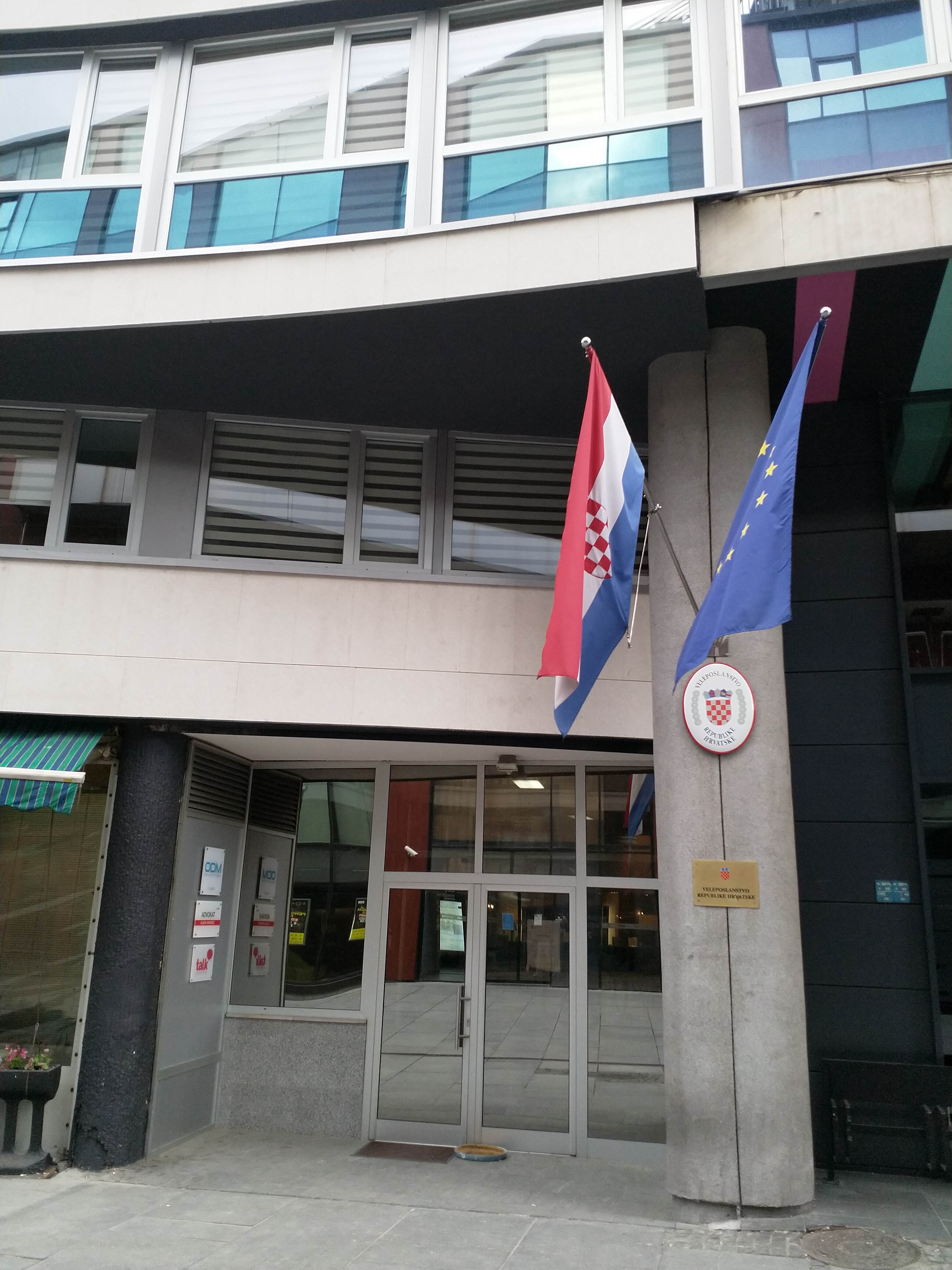 The Croatian Embassy in Sarajevo © Miłosz Pieńkowski
The Croatian Embassy in Sarajevo © Miłosz Pieńkowski
It could have been mindless vandalism, drunken idiocy, politically motivated – or even all three. The Croatian Embassy lies in the very heart of Sarajevo. It is situated just north of the river Miljacka and in the same quarter of the city as the building for the Presidency of Bosnia and Herzegovina, other government and municipal buildings, the Sarajevo National Theatre and is just across the park from the embassies of France and Austria. There are several cafes, bars, fast food restaurants and pubs close by. It is a popularly frequented part of the city at night. Unlike Croatia, businesses selling food, alcohol and other drinks are currently open. Sarajevo city centre is alive at night.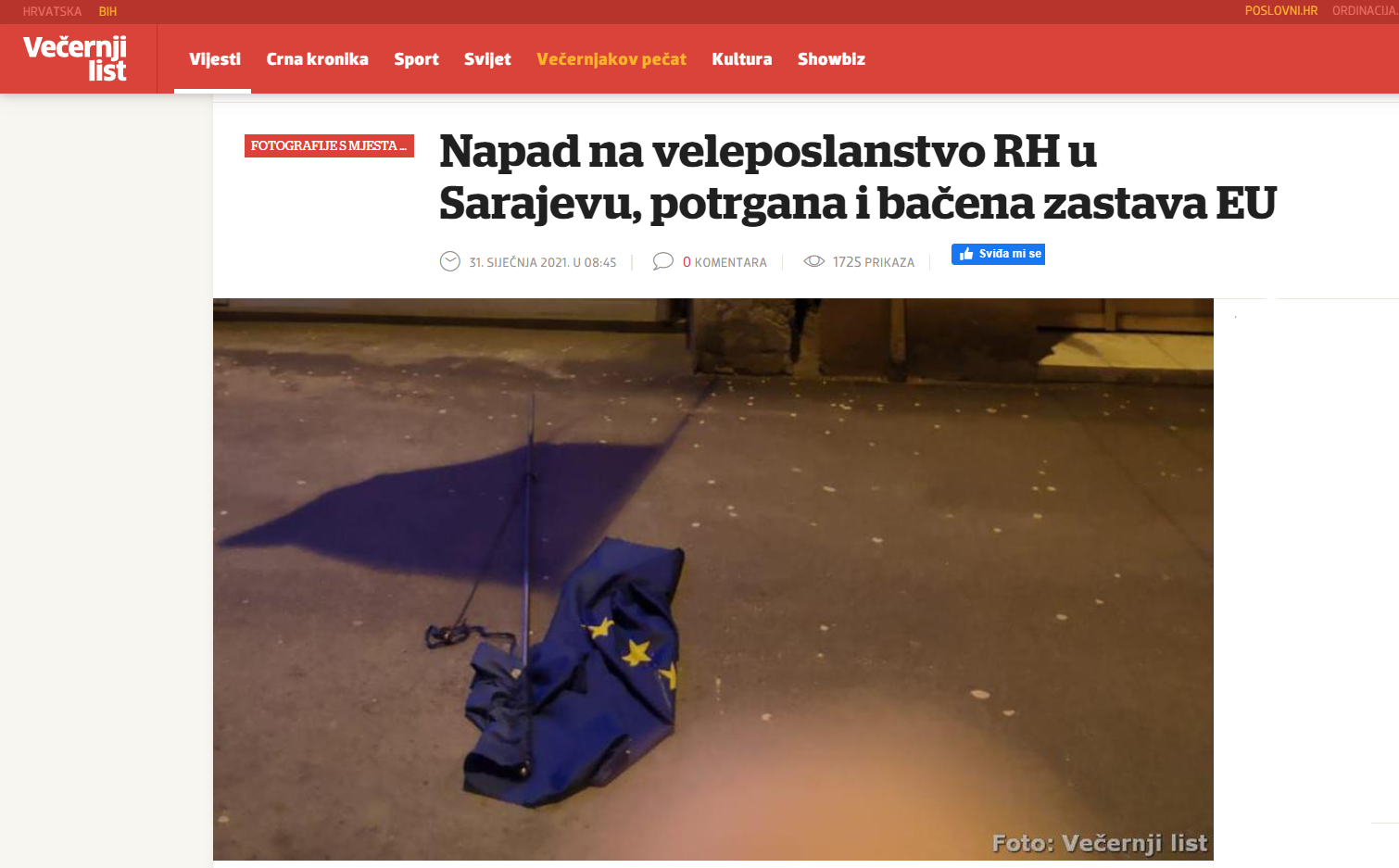
The damage caused to the Croatian Embassy was minimal. The wall mounting was damaged but held firm, as did the pole carrying the Croatian flag. The pole carrying the flag of the European Union fared less well – it snapped under the force of the aggression and was completely prized from the mounting. Last night the pole and the flag of the European Union were left lying on the darkened pavement outside the Croatian Embassy, immediately in front of the doorway above which it previously hung.
An investigation is underway and police are searching for the culprits.
For the latest travel info, bookmark our main travel info article, which is updated daily.
Read the Croatian Travel Update in your language - now available in 24 languages.
Hercegovac Begs Cro PM 'Open Borders So I Can Send My Wife To Her Mother'
January 29, 2021 – Lockdown is apparently taking a toll on one Hercegovac. The man from Široki Brijeg wrote to Croatian Prime Minister Andrej Plenković and begged him to reopen the borders between Croatia and Herzegovina so he could eject his wife from the family home for a month and send her to his mother-in-law's
The message from Hercegovac Ante Zovko (Ante Marinkov) was reposted on the Facebook page Imocki crnjaci where it picked up some 3 thousand likes in less than 6 hours.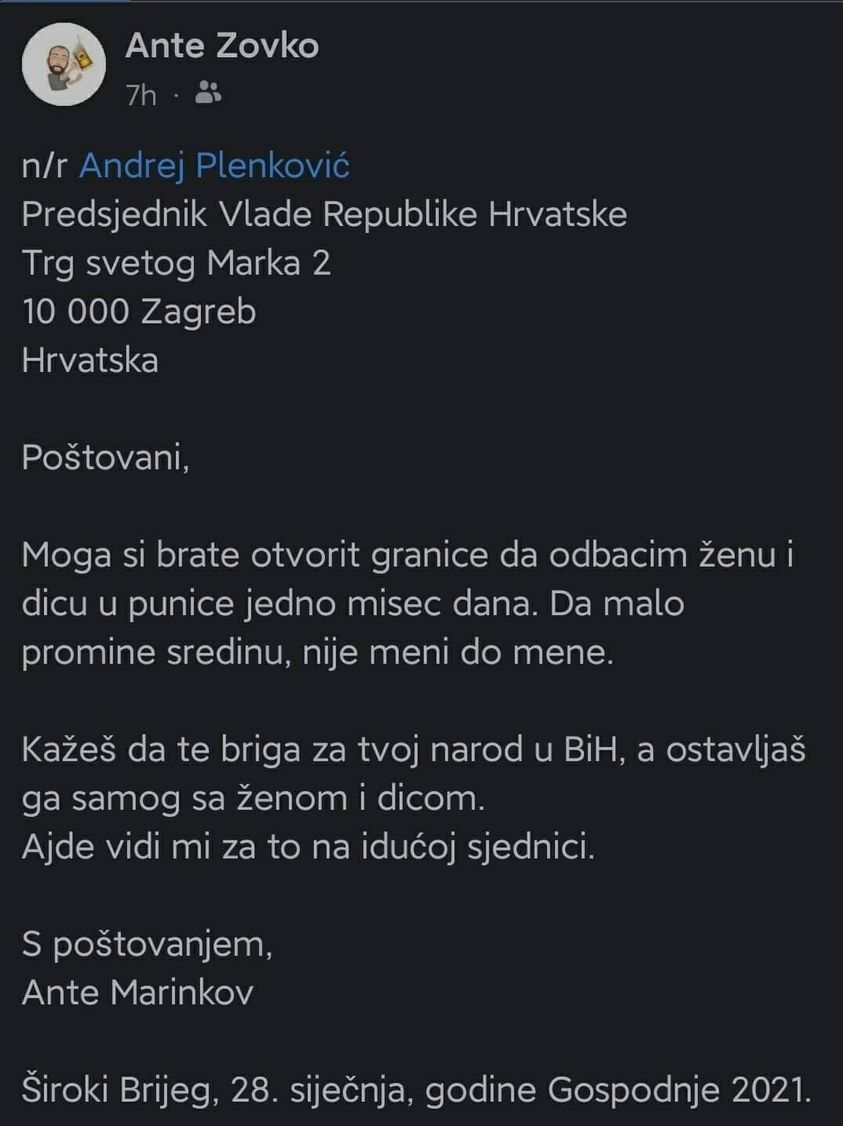
The town, Široki Brijeg, where this particular Hercegovac (a man from Herzegovina) lives is just 35 kilometres from the border with Croatia. Lots of Croatians live in this area, including this Hercegovac, his wife and his child. But not, it would seem, his wife's mother, who apparently lives in Croatia.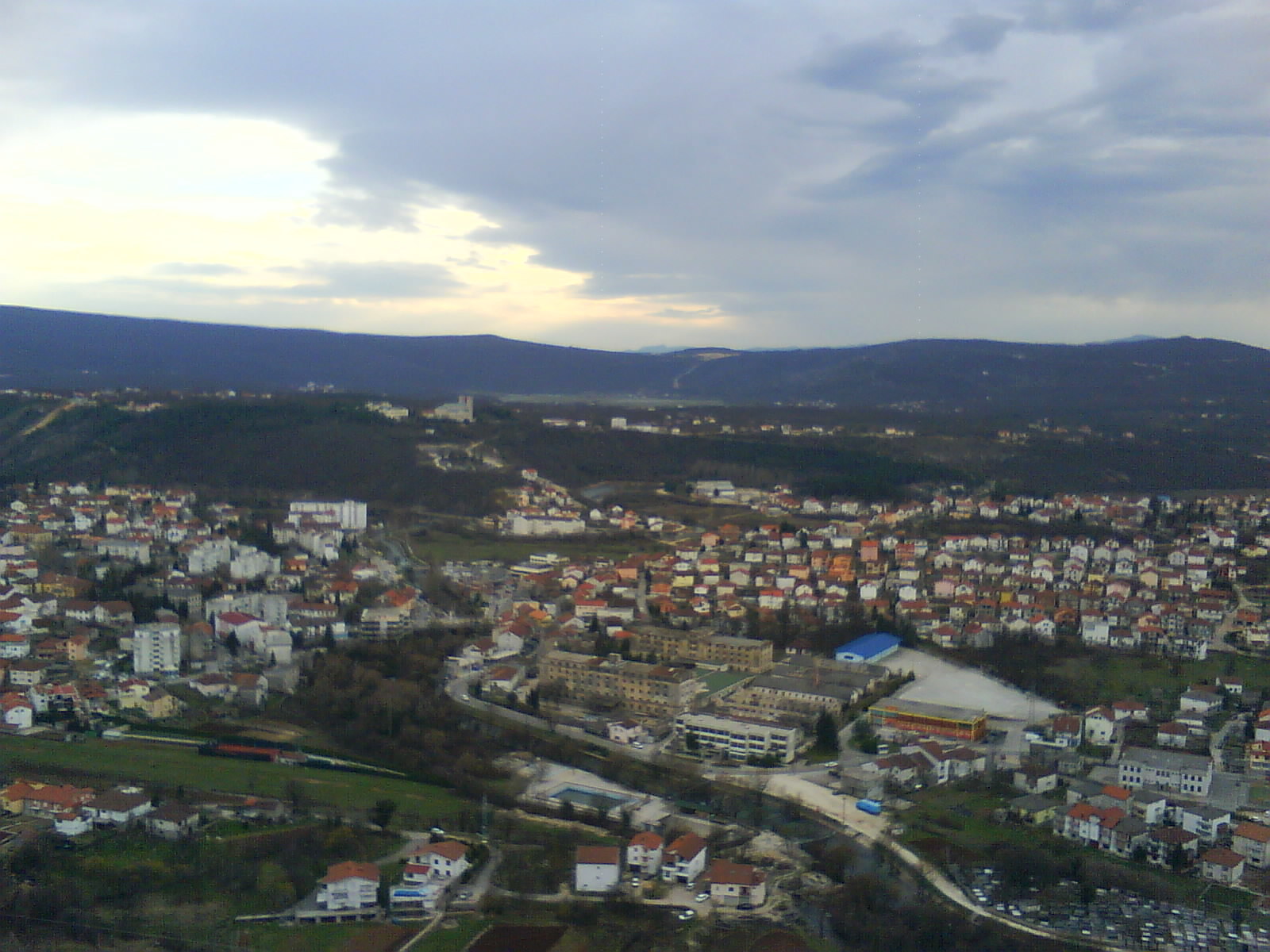 Široki Brijeg in Herzegovina, around 35 kilometres across the border from Croatia © Anto (talk)
Široki Brijeg in Herzegovina, around 35 kilometres across the border from Croatia © Anto (talk)
The Hercegovac's reason for wishing to eject his wife and child for a month was to change up the atmosphere for a time. One presumes he was not being entirely serious with his request.
The Hercegovac is not the first man to seemingly reach the end of his tether while restricted to staying in the family home. In April 2020, after just one month of being housebound, a man from a village near Osijek in Slavonia left his wife in the family home and went to live nearby in a tent.
Speaking anonymously at the time, the man's neighbour told the local SiB.hr news portal the couple have been happily married for 30 years. But, it seems the pressure of being around each other so closely during the lockdown was too much even for their strong union.
The neighbour was happy to report that since his friend pitched his tent in the nearby locale, relations between the man and his wife had actually returned to their usual levels of warmth and friendliness. The wife even came regularly to visit her husband in his tent. © John Waring
© John Waring
"My neighbour has been in his tent for a few days now,” he told the portal back in April. “He puts up a table and chairs in front. Occasionally our other neighbour comes over to drink some rakija (with him). I visited him too.”
The neighbour said his friend had quit the family home due to boredom more than anything else. Even after being happily married for 30 years, being around each other 24 hours a day was apparently just too much.
Perhaps in this more chivalrous response from the Slavonian man, Hercegovac Ante Marinkov could take some inspiration? After all, it's surely easier if one person departs from his family home in order to change the atmosphere than if two are forced to leave. Ante should find a nice spot in the fields nearby – not too close – and simply pitch up a tent. Problem solved! If he's lucky, his wife might come to visit bringing rakija.
Croatia Declares 5 January Day of Mourning for Eight Young Victims in Posusje
ZAGREB, 4 January, 2021 - The Croatian government on Monday decided to declare 5 January a day of mourning for eight young people who died of asphyxia on New Year's Eve in Posusje, southern Bosnia and Herzegovina.
Four young men and women aged between 18 and 20 presumably died as a result of asphyxiation in Tribistovo, not far from Posusje in the night between 31 December and 1 January.
Unofficial sources have said that their death was most probably due to asphyxiation caused by a gas-powered generator unit that supplied electricity to the house where they were staying.
Prime Minister Andrej Plenkovic said today that observing a day of mourning for those young victims was a sign of solidarity. He added that the decision on the day of mourning was supported by President Zoran Milanovic and Parliament Speaker Gordan Jandrokovic.
Croatia's top officials earlier sent condolences to the families of the victims and the local authorities.
Croatian President: Dayton Deal Can't Be Amended Without All 3 Peoples' Consent
ZAGREB, Dec 12, 2020 - Croatian President Zoran Milanovic said on Friday that the amending of the Dayton Peace Accords or any strategic decisions could not be made without the consent and agreement of all the three constituent peoples in Bosnia and Herzegovina.
The Dayton Agreement is what it is, and I cannot see any possibility of amending it without violence, and I do not think of a war when mentioning violence, I refer to mental violence and any other violence in Bosnia and Herzegovina, and everyone is aware that it could never pass in Bosnia and Herzegovina and it has always provoked a larger-scale violence, Milanovic said in an interview for the HRT broadcaster commenting on the forthcoming 25th anniversary of the conclusion of the Dayton peace accords.
He said that the Dayton agreement framework could not be amended without the will of all the three constituent peoples.
No one should have illusions that any strategic decisions could be made if there was no consent of all the three constituent peoples. This is not any medieval concept, this is a prerequisite for any civic state, the Croatian head of state said and then summarized his message this way: "First use soap and then afterwards apply perfume."
He went on to says that in the last five years only "lower-ranking clerks" from the international community had discussed the situation in Bosnia and Herzegovina.
"Those are people who are almost let loose, who are tailoring and keeping maps and pairs of compasses, sets squares, rulers in their hand, they are giving instructions on what something should look like, instead of getting their own house in order first."
He went on to say that no matter what he thought of it, the Serb entity - the Republic of Srpska - in Bosnia and Herzegovina could not be annulled.
Milanovic underscored that it was no secret that of the three constituent peoples, the Croats were dissatisfied with the current situation.
Support to any decision on purchase of multipurpose Air Force jets
President Zoran Milanovic said that he would support any decision which the Andrej Plenkovic government would made on the purchase of fighter jets, adding that he was well informed of that process.
Defence Minister Mario Banozic has recently said that the government would decide on the procurement of fighter jets at the beginning of 2021 and that a contract to that effect could be signed in late 2021. Croatia has received four offers. The United States is offering the new F-16 Block 70, Sweden is offering the new Gripen C/D model, while France and Israel are offering used aircraft - Dessault Rafale and F-16 Block 30 respectively.
Milanovic said that he had previously suggested that the most logical move could be the acceptance of the US offer, because the Americans are long-term and long-standing partners, however, they should make an effort and provide Zagreb with solid arguments for the choice of their offer in compliance with the tender.
Small Border Crossings between Croatia and Bosnia to Reopen on Thursday
ZAGREB, Oct 14, 2020 - Sixteen small border crossings between Croatia and Bosnia and Herzegovina that have been closed since April in an effort to prevent the spread of the coronavirus will be reopened on Thursday, Bosnia and Herzegovina's border police said on Wednesday.
After an agreement was reached between the two countries, small border crossings will be reopened to facilitate crossings for children who attend schools in Croatia and business and agricultural activities in cross-border regions.
"Border crossings will be opened to traffic as of 15 October 2020. Crossing the border will be conducted in accordance with the agreement and valid legislative regulations," Bosnia's border police informed.
Residents in the area around Tomislavgrad, Capljina and Ljubuski have protested on several occasions over the past month and called for small border crossings to be reopened so that their children attending schools in Croatia can cross the border more easily.
For the latest travel info, bookmark our main travel info article, which is updated daily.
Read the Croatian Travel Update in your language - now available in 24 languages.
Time To Reflect, As Loyalty Not Luxury Saves 2020 Croatia Tourist Season
September 28, 2020 – The tail end of 2020's unparalleled summer offers opportunity for pause, contemplation and appreciation, as it's loyal and not luxury guests that have saved this year's Croatia tourist season.
In this day and age, things always have to get better. There's no room to sit still. Life without improvement is deemed a failure. Nowhere is this more true than the Croatia tourist season.
The numbers of overnight stays in the Croatia tourist season sometimes seem to be the only measure by which its success is judged. Year after year, the numbers must rise. Any decrease is unthinkable. At the same time, hungry eyes still want more. Some want to reposition themselves. A new class of guest is wanted, from faraway nations. They must be of a better quality. They must stay longer, in more expensive dwellings. They must spend more.
Incredible initiatives are undertaken to turn this want into a reality. But, at the end of the 2020 Croatia tourist season, perhaps it's time to pause and reflect. For this year, it is undoubtedly loyalty and not luxury that's saved the Croatia tourist season.
In the year the coronavirus pandemic hit, arrivals by charter plane and cruise ship were seriously curtailed. So much for the flying visits of premium guests from far-flung lands. Instead, the tourists who came were from much closer to Croatia.
The English language that most on the coast are so familiar with was this year useless. On the beaches of Istria and northern Dalmatia, it was Slovenian, Polish, Czech, German, Slovakian and Italian that was heard. The packed bars of Makarska echoed with the familiar call of 'Đe si, bolan?' (where are you, bro? - in Bosnian dialect). Many of those who came drove to Croatia. And many do so every year.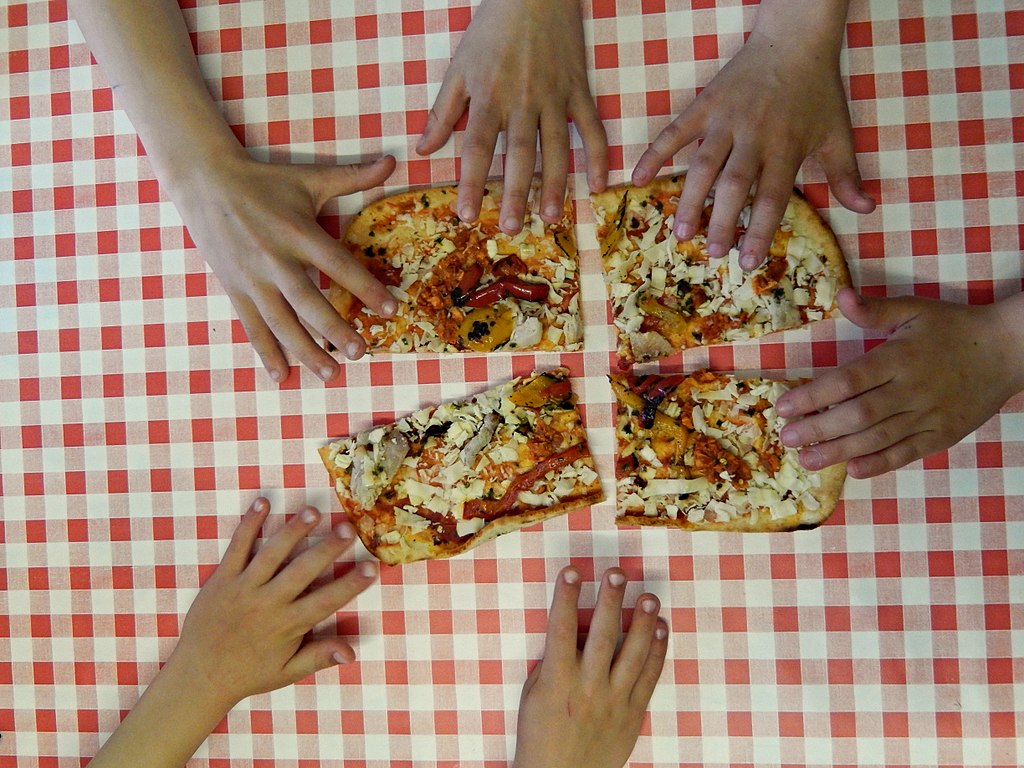 © Jeremy Segrott
© Jeremy Segrott
Sighs and light-hearted jokes about some of these guests persist in some places. “That family come every year, but they only ever order one pizza to share between the four of them.” The choice of footwear of some German-speaking and Czech visitors frequently draws chuckles, in particular, the classic sock and sandal combo. But, just where would the 2020 Croatia tourist season have been without the 60,000 Czech and Slovak visitors who this year arrived by train?
Just two days ago, Jutarnji reported on phenomenal numbers of Polish visitors this year. Would anyone else really have taken the place of the returning family of four sharing a pizza? Just what would the season in Makarska have looked like without bolan?
Croatians are famously very appreciative hosts. On the ground, there's no doubt that such loyal guests are warmly welcomed and thanked each year by accommodation renters, restaurateurs and others. They greet returning visitors with smiles of familiarity and reserve for them their favourite place. In September 2020, gratitude to such guests was echoed by The Croatian National Tourist Board as they launched a new campaign 'Thank you', directed at the tourists who this year chose Croatia.
Perhaps it is time to ensure that this gratitude extends into any grand new initiatives for growth in the Croatia tourist season? Such loyal guests should not be taken for granted, nor forgotten.
Initiative within the Croatia tourist sector is vital. The unlocking of continental Croatia's potential is simply a must. That too of the Dalmatian hinterland and inland Istria. The exploitation of world-class Croatian assets such as nature, agriculture and health and wellness services are also perfectly on-point. The desire to attract a better class of bigger-spending visitor to luxury holidays on the Croatian coast should surely be a lower priority. After all, eyes that covet can all too frequently fail to appreciate that for which they should already be thankful.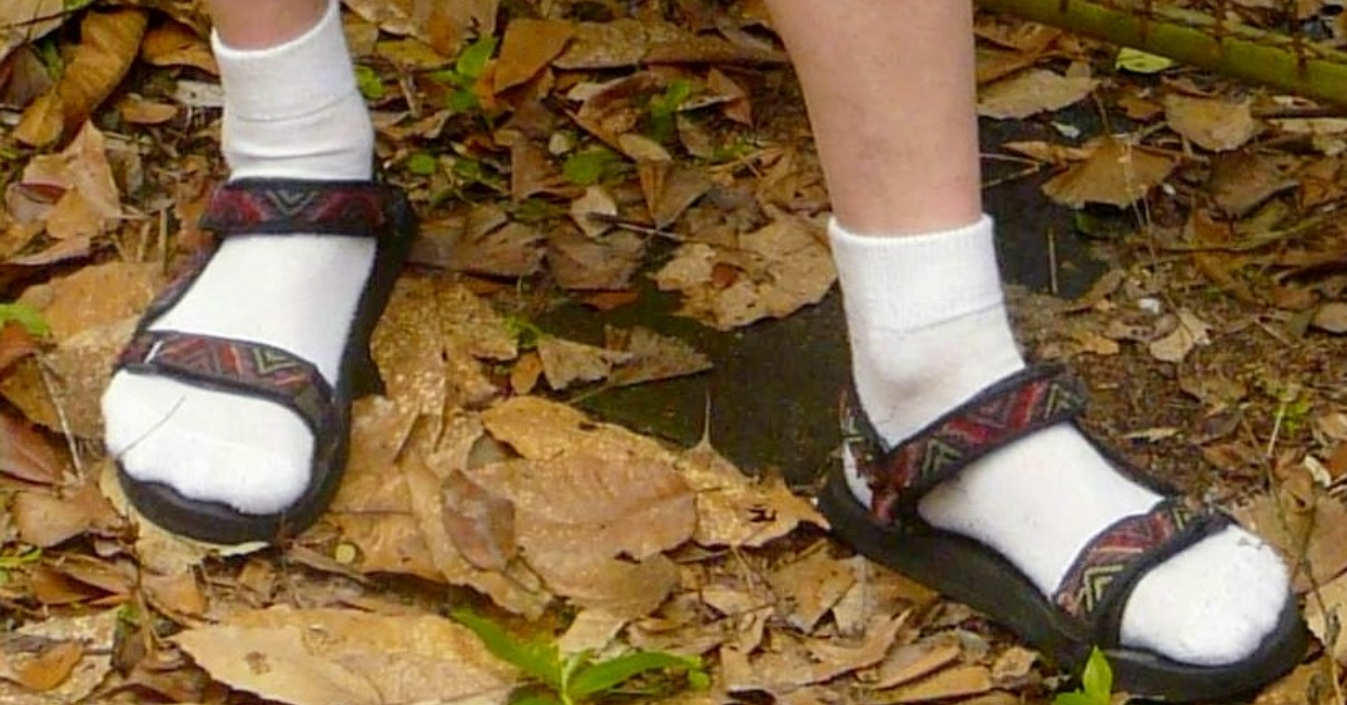 © Oddman47
© Oddman47
Lead image adapted from an original photograph by © Marco Verch
For the latest travel info, bookmark our main travel info article, which is updated daily.
Read the Croatian Travel Update in your language - now available in 24 languages
PM: Croatia is the Advocate of Bosnia and Herzegovina and Croats
ZAGREB, Sept 14, 2020 - Prime Minister Andrej Plenkovic said during a visit to Mostar, south Bosnia and Herzegovina on Monday that Croatia is the advocate of Bosnia and Herzegovina and Croats' rights and that he expected the Dayton Peace Accords would be respected and that Croats would no longer be outvoted.
"As before, we will strongly support Bosnia and Herzegovina, develop cooperation with all three constituent peoples, with all citizens of Bosnia and Herzegovina, and be the country that supports Bosnia and Herzegovina on its way to the EU and the North Atlantic Treaty Organisation," Plenkovic told a press conference following a meeting with Dragan Covic, the leader of the Croatian Democratic Union of Bosnia and Herzegovina (HDZ BiH).
Plenkovic had arrived for the inauguration of Petar Palic as the new Bishop of Mostar-Duvno.
Asked about announcements by leading Bosniak officials that they would outvote Croats in the 2022 elections and impose lower-level officials as well, and not only the member of Bosnia and Herzegovina's Presidency, Zeljko Komsic, Plenkovic said that it was important to respect the Dayton/Paris Peace Agreement.
He said he expected that the leading Bosnian Croat party, the HDZ BiH, and the leading Bosniak party, the Party of Democratic Action (SDA), would reach an agreement on amendments to the Elections Act to put an end to the practice of outvoting Croats.
HDZ BiH leader Covic said that he had earlier warned SDA leader Bakir)Izetbegovic that the imposition of political representatives had caused problems in the past.
Commenting on the situation in South-East Europe after the election in Montenegro and the talks between Serbia and Kosovo, Plenkovic underscored that Croatia was committed to stability in all neighboring countries.
"What is important to Croatia is that there is stability, that there is peace and that tension is reduced, and that trade flows are stabilized. In all this, we take into account the Croatian minority and Croats in Serbia. We are sorry that due to division between the two Croatian parties the electoral threshold in Montenegro was not passed to obtain a seat in the parliament, a representative of the Croatian ethnic minority," Plenkovic said.
After talking with the HDZ BiH leader, Plenkovic met with Ratko Peric, the outgoing Bishop of Mostar-Duvno, and his successor, Petar Palic.
A diocesan cultural center opened in Mostar on Sunday, the construction of which was also financed by the Croatian government.
For the latest travel info, bookmark our main travel info article, which is updated daily.
Read the Croatian Travel Update in your language - now available in 24 languages
Hero Croatian Hospital Does Free Dentistry for All Special Needs Children
Wednesday, 9 September 2020 – Angels in white from heroic Croatian hospital Dr. fra Mato Nikolić in Nova Bila offer free dentistry for all special needs children
Few young people look forward to visiting the dentist. But, imagine how such a visit must be if the world is already a confusing and difficult place for you. These are the difficulties of dentistry for all special needs children.
“Children with special needs suffer from a range of disorders,” Dr. Nikola Matković tells TCN over the phone from Croatian hospital Dr fra Mato Nikolić in Nova Bila, near Vitez, central Bosnia. “They can have stunted mental development, autism, Down's syndrome, disharmonic development, epilepsy, cerebral palsy. They all need to put under general anesthetic for dentistry and, of course, that requires a specially trained anesthetist to be present throughout, as well as the surgeon dentist and several members of staff. It can be necessary to have between six and ten highly skilled medical professionals in the operation, depending on the case. And, of course, that's very expensive. The parents of many children simply don't have that kind of money.”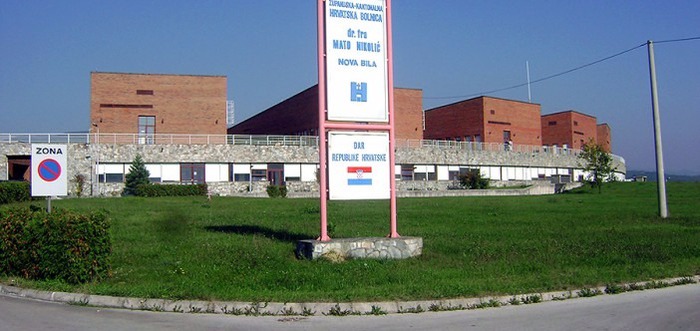
Croatian hospital Dr. fra Mato Nikolić in Nova Bila, which answered the call for free dentistry for all special needs children
A doctor of dentistry, Nikola Matković became acutely aware of the financial difficulties for many such parents in 2016, when NGO Betanija from Vitez put out a call for help. His main job is there, in the local health centre. They help provide care for about 50 special needs clients in the region. Responding to the call, Dr. Matković approached colleagues to see if they'd be interested in trying to help give free dentistry for all special needs children.
Dentist Lidija Lasić-Arapović and anaesthesiologist Zoran Karlović, both from Mostar, were quick to offer their assistance. They were followed by dentists Dr. Anja Hačimić, Dr. Ivana Dunđer-Vidović, Dr. Nikola Kezić, Dr. Ozrenka Raić from central Bosnia and assistants Slavica Šimić and Anita Martinović from Mostar. All agreed to join Dr. Matković in his attempt to offer free dentistry for all special needs children in their region.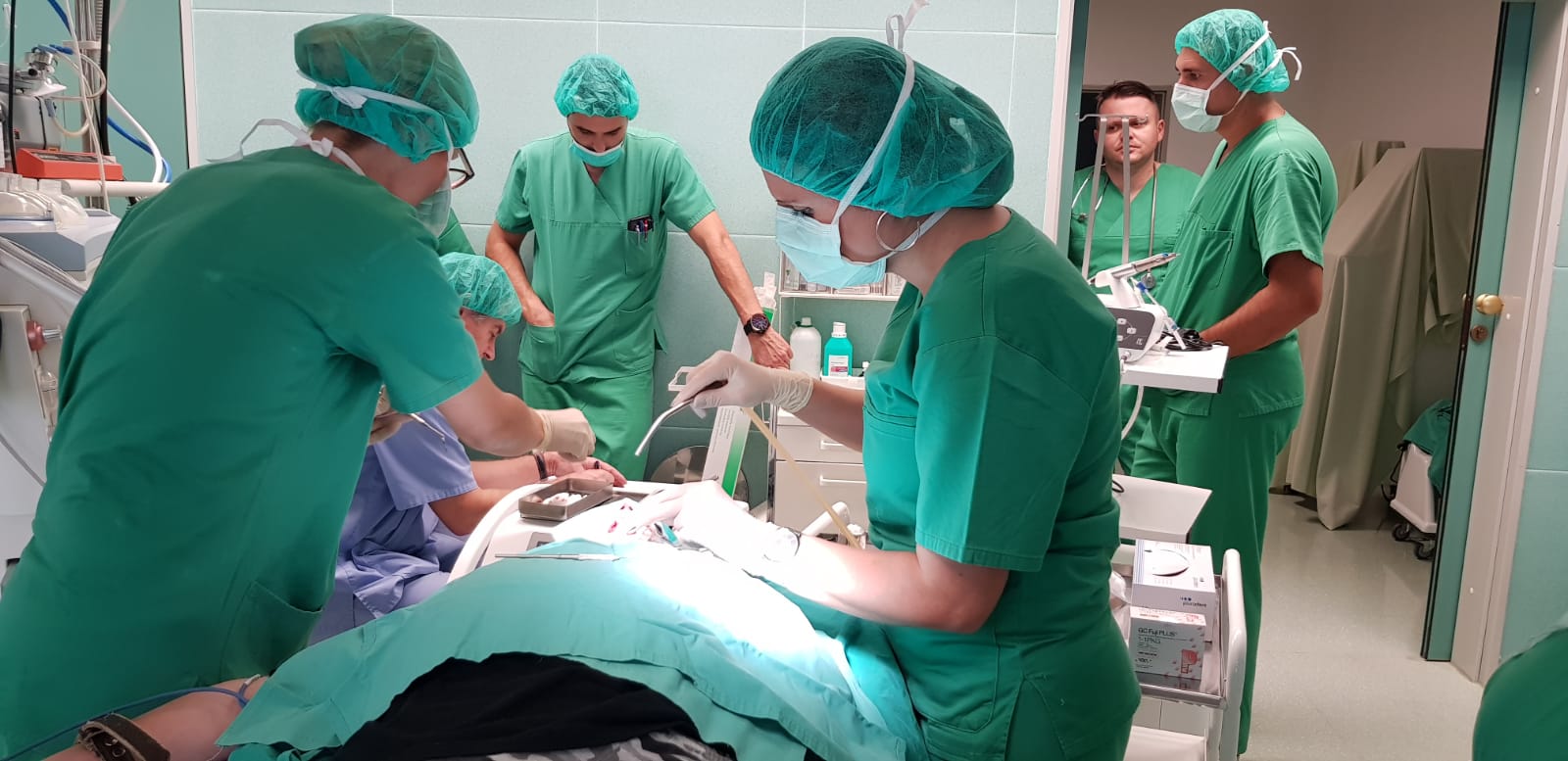
The team of Croatian hospital Dr. fra Mato Nikolić doctors at work, supplying free dentistry for all special needs children
Dr. Matković needed the approval of the Ministry of Health and of Central Bosnia Canton and authorities at the Croatian hospital Dr fra Mato Nikolić, lead by director Dr. Velimir Valjan, in order to begin the programme. Both quickly agreed that it was needed and agreed to contribute funding to help establish it. The programme of free dentistry for all special needs children in the Central Bosnia Canton region started in late 2018. But, that was just the beginning.
“We soon started getting calls from parents of special needs children from outside the region,” remembers Dr Matković. “And from full-time carers of adults who also have special needs. We soon realised we could not just leave them with nowhere to turn. We again approached the authorities and asked for permission to widen the programme and they were incredibly supportive. We've so far had around 120 clients, between the ages of six and thirty-five. And they've travelled here for treatment from every corner of Bosnia.”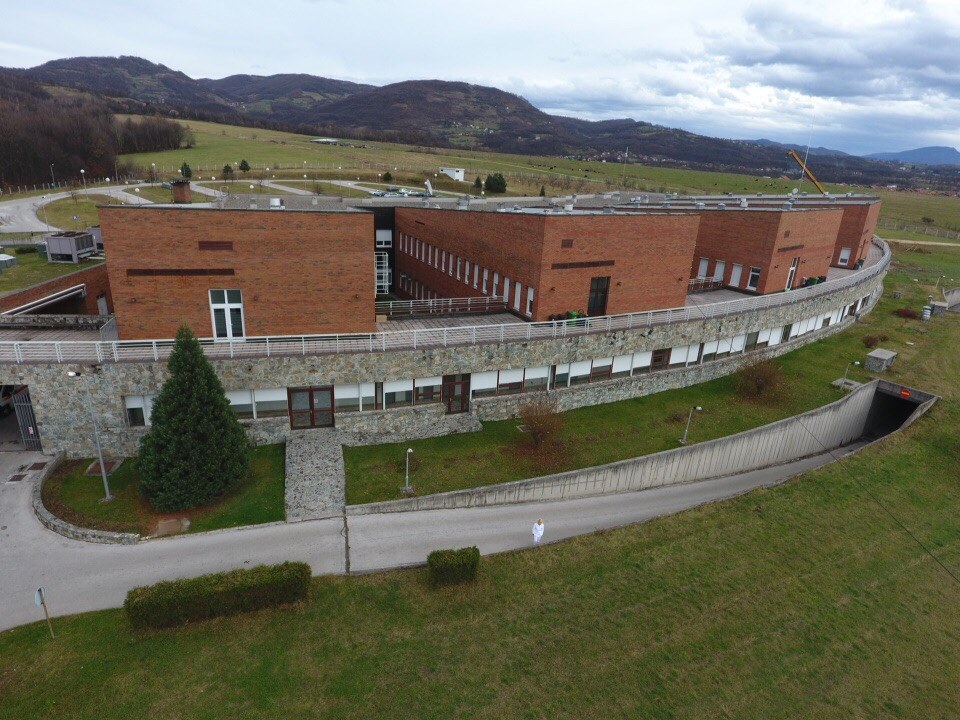
Croatian hospital Dr. fra Mato Nikolić. Welcoming all ethnicities and people of all religions, it gives free dentistry for all special needs children
For an outsider – such as this writer – if can be baffling to try and understand how Bosnia and Hercegovina works. The country is populated by the same people, although they've been separated for hundreds of years by three competing religions. This separation led to ethnic tensions rising during the break up of Yugoslavia, leading to Bosnia now being split up into several internal cantons under one federation, another autonomous state - Republika Srpska - plus the self-governing district of Brčko.
“This question may be stupid, but is healthcare the same in Bosnia as it is in Croatia?” asks this British member of the TCN team, rather naively. “Do you have the same option of health insurance to all the people who live there, no matter where they live? And, you're called Croatian hospital Dr fra Mato Nikolić. Does that mean that you treat only Croats? Do Muslims and Serbs have their own separate hospitals?”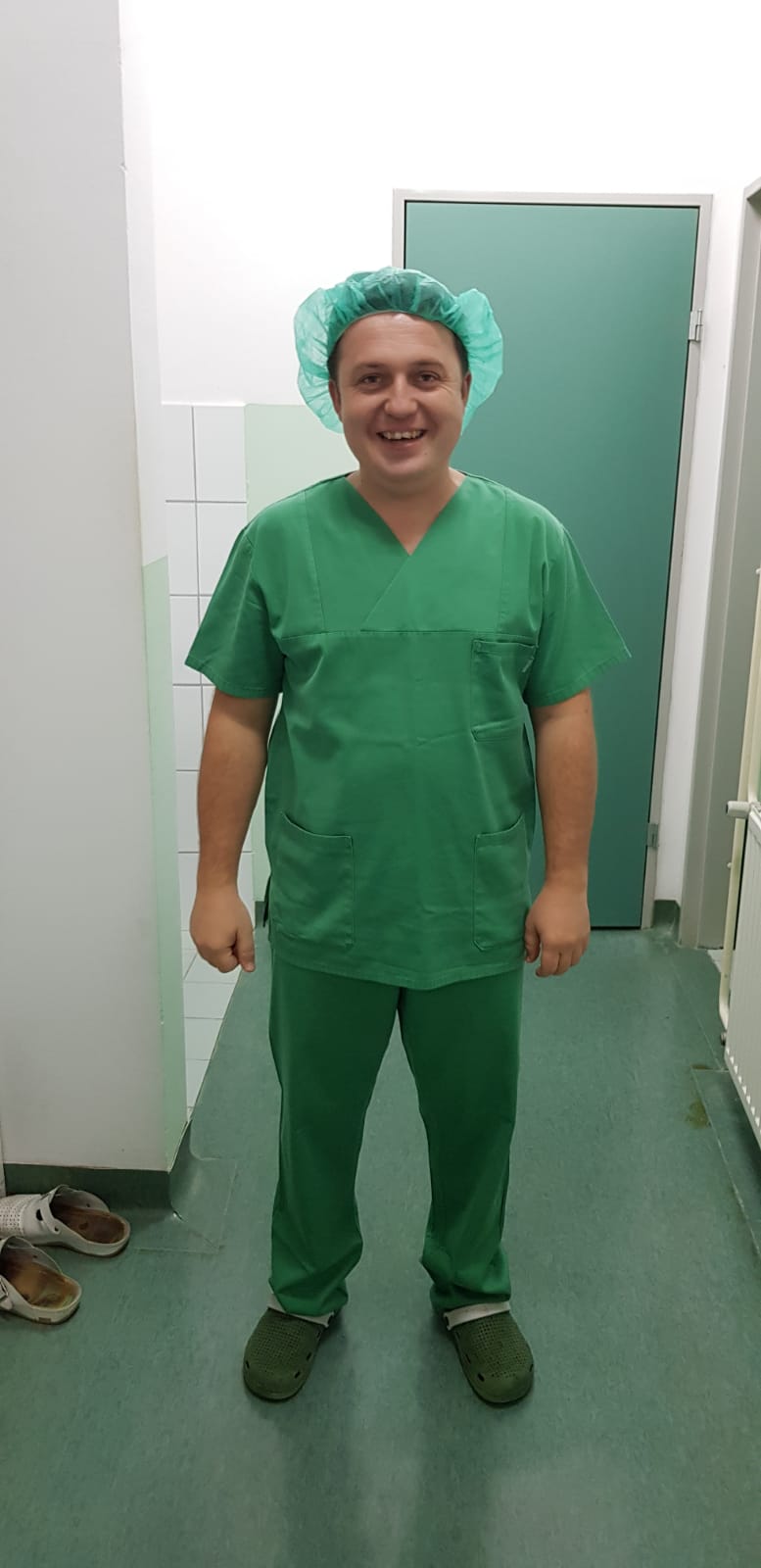
Dr Nikola Matković
“Ahahaha, it's not such a stupid question really,” laughs Dr Matković. “Bosnia can be a confusing place. Well, the answer to your first question is no. It's not the same as in Croatia, it's a lot more complicated because there's a completely separate system for those who live in Republika Srpska. But, I'm pleased to say that we have overcome all the bureaucracy and difficulties to be able to treat patients from every part of Bosnia, including Republika Srpska. The NGO Betanija who set the ball rolling is a multi-ethnic organisation. They welcome people of every ethnicity and religion. So do the Croatian hospital Dr fra Mato Nikolić and this programme within it. Our hospital is called Croatian hospital because it was set up with great financial assistance from the Croatian government.”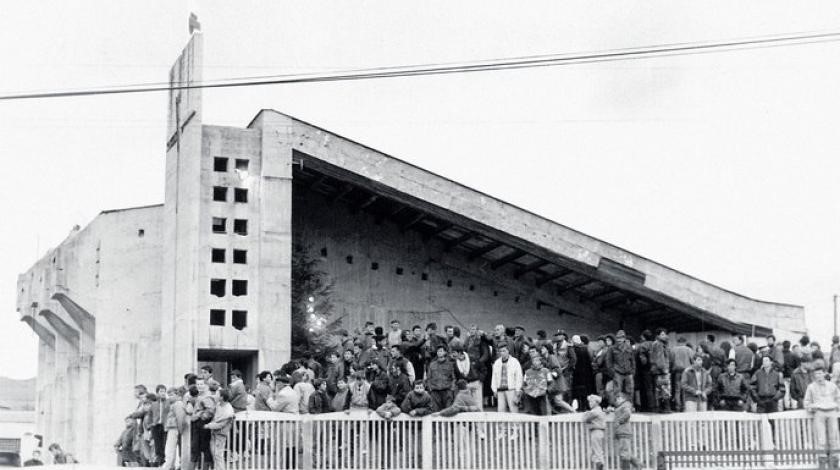
The parish church of the Holy Spirit in Nova Bila became the only medical resource for some 70, 000 trapped people during the war. Around half of them were refugees.
Croatian hospital Dr fra Mato Nikolić is named after a prominent Bosnian Franciscan, humanist and the first graduate doctor from Bosnia and Herzegovina - Fr. Mato Nikolić (1776-1844). It is a hospital known throughout Bosnia and Croatia because of the heroic work undertaken there by staff and volunteers during the time of war.
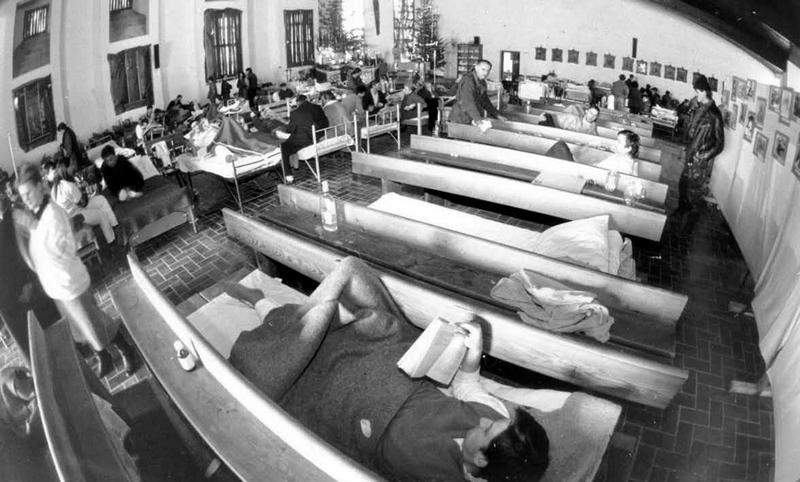
The church hospital in the time of war
In 1992, violent fighting caused a huge wave of forced migrations all across Bosnia. In the area where the hospital is now situated, the population almost doubled with the arrival of refugees. Some 70,000 people found themselves in an area 30 kilometers long and 2 kilometers wide. They were cut off from the rest of the world by the lines of fighting and by blockades. No hospital existed within the area, just the parish church of the Holy Spirit in Nova Bila. From there, a few healthcare professionals worked day and night, with almost no supplies, to treat the sick and wounded. So cut off was this group of people that they faced famine. The absence of any medical supplies was secondary to the very real threat of starvation.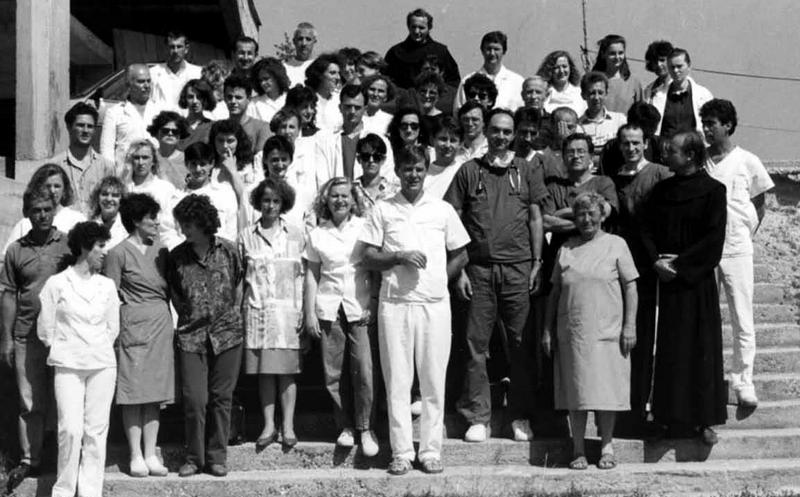
Staff of the war hospital Fr. Mato Nikolić pictured in 1993
War hospitals set up to try and deal with the trapped people proved ineffective, as the lines of fighting were constantly shifting. But, at the end of 1992, it was decided that the church in Nova Bila would be established as the main hospital for all those within the four municipalities of Travnik, Novi Travnik, Vitez and Busovača in the Lašva Valley. This war hospital took the name Fr. Mato Nikolić.
Despite having no regular supplies of electricity or even water, between 19 October 1992 to 1 April 1994, over 20, 000 people were treated and cared for in the hospital. 1,260 operations were performed under general anesthesia, 4,200 under local anesthesia. 721 children were born.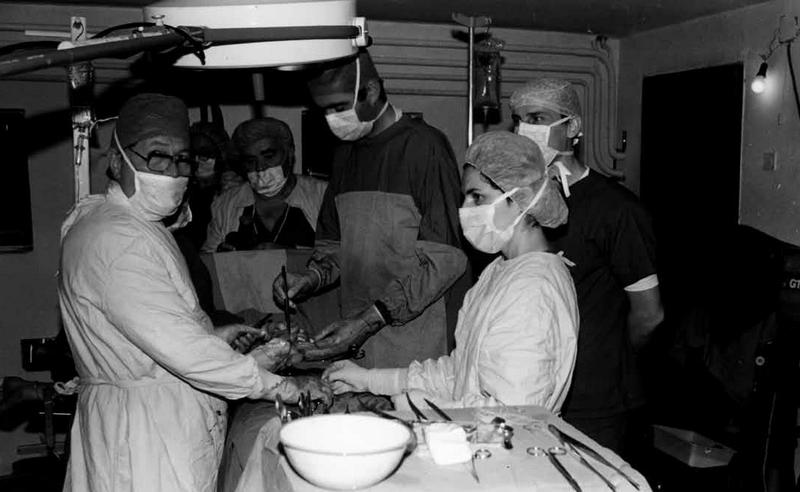
Despite having no regular supplies of electricity or even water, between October 1992 to April 1994, over 20, 000 people were treated and cared for in the hospital. 1,260 operations were performed under general anesthesia.
In June 1994, the President of the Republic of Croatia, Dr. Franjo Tuđman, visited the Lašva Valley and promised to build a new hospital. The new Croatian hospital Dr. fra Mato Nikolić was opened in 1999. Its pioneering programme to offer free dentistry for all special needs children from across Bosnia is just the latest commendable action undertaken by those associated with this hero hospital.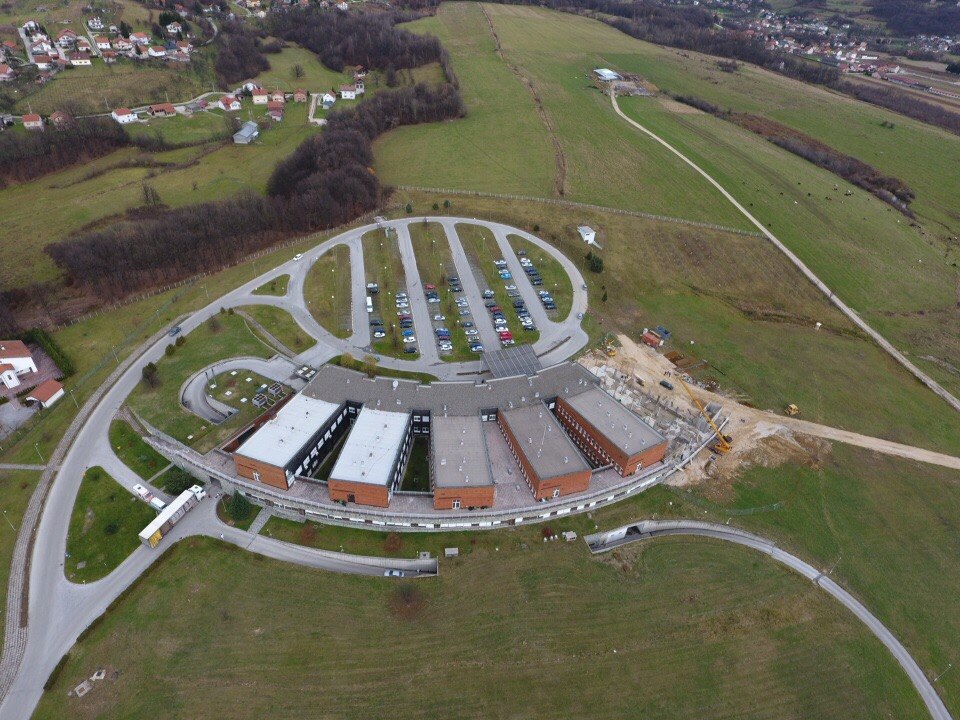
How the new Croatian hospital Dr. fra Mato Nikolić looked a few years ago, as its sixth wing was being constructed
All colour photographs © Croatian hospital Dr. fra Mato Nikolić, Dr Nikola Matković and municipality of Vitez
All black and white photographs © Bijeli Put documentary, original sources Davor Višnjić, Željko Maganjić, Srećko Stipović, Arhiv konvoja Bijeli put, Arhiv Kruh svetog Ante, Foto klub Split
For the latest travel info, bookmark our main travel info article, which is updated daily.
Read the Croatian Travel Update in your language - now available in 24 languages
Croatia Ranks Third In Region For Quality Of Customer Service - Survey
ZAGREB, Sept 2, 2020 - Croatia once again ranks third in the region for the quality of customer service, behind Bosnia and Herzegovina and North Macedonia, the "GUEST-Regional Services" survey showed on Wednesday.
This is the twelfth survey testing the quality of customer service in the region, conducted between 15 June and 15 July by the Heraklea mystery shoppers agency in cooperation with similar agencies in Bosnia and Herzegovina, Montenegro, North Macedonia, Serbia, and Slovenia.
"Mystery shoppers" visited a total of 800 retail outlets in those countries - car dealerships, banks, petrol stations, small stores, supermarkets, telecommunication retail outlets, tourism-hospitality venues, and other services.
The criteria to measure customer service included greetings, identifying shoppers' needs, knowledge of the product being offered, offering additional products, and thanking shoppers for stopping by, based on the acronym GUEST that stands for Greet, Understand, Explain, Suggest and Thanks.
Croatia scored 75.1% and ranked third, the same result as last year.
Croatia again scored best on knowing the product on offer. Croatian retailers were also good when it comes to greeting shoppers and thanking them for stopping by. Their weaknesses included not identifying the need for shoppers and offering additional products.
Bosnia and Herzegovina tops the list this year
The best result this year was achieved by Bosnia and Herzegovina (86.7%), followed by North Macedonia (82.5%), Croatia, Slovenia, Serbia, and Montenegro.
The best customer service in the region was experienced in car dealerships (97.2%), while supermarkets scored 58%, recording the greatest fall in quality compared to last year.
The biggest improvement in the quality of customer service was achieved by banks, increasing by 10.3 percentage points to 78.53%.
For the latest travel info, bookmark our main travel info article, which is updated daily.
Read the Croatian Travel Update in your language - now available in 24 languages


